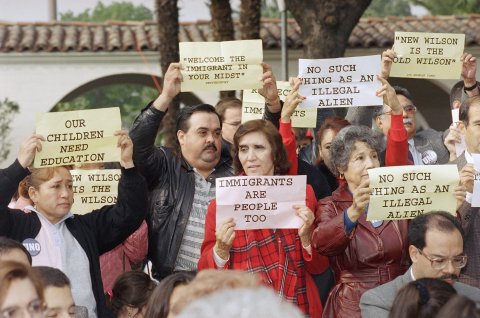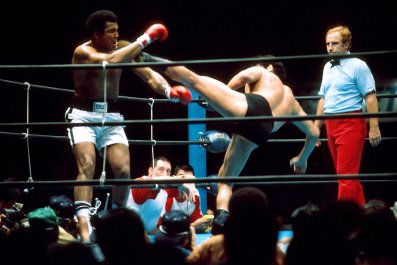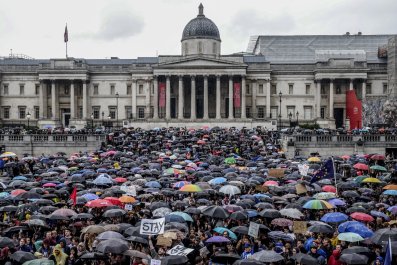
California Governor Pete Wilson wasn't backing down. After speaking at the Heritage Foundation, a conservative Washington, D.C., think tank, on November 19, 1994, he was immediately pressed to respond to charges of racism over a ballot initiative the state had passed days earlier to block public services for immigrants without documentation. Those kinds of suggestions, the governor snapped, are "insulting to the people of California who voted for it who are neither racists nor immigrant bashers." The Republican also used the occasion to double down on his immigration crusade, which had defined his race for re-election earlier that year. "I will do all that I can to advance the cause of ending illegal immigration."
Twenty-two years later, another Republican is making "illegals" the centerpiece of his campaign, a controversial gambit that Donald Trump hopes will win him the White House. But as Wilson and California's Republicans discovered, it could lose them not just Latinos but a generation of voters for elections to come.
"Trump's anti-immigrant tactics are straight out of Pete Wilson's playbook in 1994," says Larry Sheingold, a longtime Democratic campaign consultant in California. In both cases, the electorate is awash in economic angst—California faced a paralyzing financial crisis in the early '90s; now the entire country is struggling to recover from another—and enraged by a seeming lack of response from a government that has been deadlocked for years. Like United States voters today, California's were older and whiter than the population as a whole and responded to Wilson's argument that the state's budget woes required a get-tough approach to immigrants without documentation, whom he blamed for draining state resources. Proposition 187, which local activists successfully placed on the ballot in May 1994, proposed blocking those immigrants from receiving public services like education and health care. It would become the animating force of the election that fall, winning handily in November, and friends and foes alike agree Wilson wouldn't have won re-election had he not ridden that same political wave. But it marked the beginning of a downward spiral for Wilson's party in California.
Trump's critics are now issuing the warning: Beware the California example. They note that since voters passed the Wilson-backed Proposition 187, California has seen its politics swing from that of a legitimate national battleground, with Republicans regularly winning statewide office, to one where Democrats have won virtually every statewide seat since 1994. Supporters of 187, like Dan Stein, president of the Federation for American Immigration Reform, argue that California's deepening hue of blue isn't because of a backlash against the GOP but rather the result of a flood of low-income immigrants who are drawn to the Democratic Party's promise of handouts, upending California's old partisan balance,
Critics of 187, as well as many historians, blame the shift on the fact that the state party turned off Latinos—then on the verge of a demographic explosion—by embracing the initiative. Never mind that the measure was promptly blocked in the courts and never implemented. The message that was delivered, says former head of the state Latino Legislative Caucus Richard Polanco, was that the GOP "is a party that is not about inclusion, it is a party that is anti-immigrant."
Latinos are hearing the same thing in Trump's aggressive rhetoric. According to one recent poll, 87 percent of registered Latino voters have an unfavorable view of the mogul, suggesting he won't even match 2012 nominee Mitt Romney's measly 27 percent of the Latino vote. But even if Republicans are prepared to write off Latinos, there's another reason the California example should make them nervous.

What a trio of professors found in 2006 is that Proposition 187 was indeed a significant factor in the state's partisan shift. But it wasn't 187 alone, and it wasn't just Latinos who were affected. In their 2006 paper in the American Political Science Review, professors Shaun Bowler of the University of California at Riverside; Steven Nicholson, then of Georgia State University; and Gary Segura, then at the University of Washington (now an adviser to Hillary Clinton), concluded that Proposition 187 and two successive GOP-backed ballot initiatives—1996's Proposition 209, which banned affirmative action at state institutions, and 1998's Proposition 227 restricting bilingual education in public schools—changed the balance of California's politics. Together, they sent Latino voters flocking back to the Democratic Party, after they'd cozied up to Republicans in the 1980s. Ronald Reagan, in particular, actively courted Latinos during his White House bids, and the former California governor won 45 percent of that vote in the state in his 1984 re-election.
Unexpectedly, the research also found that white voters moved toward the Democrats, thanks to Propositions 187 and 227, though to a smaller degree than Latinos. Young whites under 30 were the most likely to turn against Republicans. "This stands in sharp contrast to the expectation that the GOP would benefit in the long run from raising the salience of issues like immigration and bilingual education," the professors wrote.
Why would California's young white residents turn against the GOP over policies that most in their demographic group were then embracing? It has a lot to do with how they see themselves. No one likes being labeled a racist, and young people in particular tend to be more progressive on race than the generation that precedes them. So while research has found that white voters will respond to "dog whistle" politicking—where politicians use coded language that resonates with a certain group—most "reject blatantly racial appeals," the professors concluded. The protest movements that sprung up in response to Proposition 187 and its successors may not have stopped the initiatives from passing but they eventually colored the impressions young people had of those proposals as anti-immigrant and anti-minority. That in turn led them to sour on the party that supported them.
Trump, meanwhile, is making comments that, in House Speaker Paul Ryan's words, are the "textbook definition of racist." Wilson, by comparison, comes off as the epitome of subtlety. The California governor did get blowback for the infamous ad he ran late in the '94 campaign, featuring grainy, black-and-white footage of immigrants skittering across border crossings like rats. "They keep coming," intones a male voice, ominous keyboard music pulsating in the background. But Wilson at least avoided the name-calling Trump is famous for. Far from labeling immigrants without documentation "rapists," Wilson told NBC News in August 1994 that in California those immigrants "in many respects are themselves admirable people, but people whom we cannot afford to continue to educate, to provide health care."
With Americans drawn into the 2016 circus-cum-election like few other political events, Trump's message is reaching a wide swath, including many first-time voters and even those still too young to vote, who may not yet have strong partisan attachments. If California is any indicator, the GOP could be headed for trouble. And given the growing clout of millennials, who this year overtook baby boomers as the country's largest generation, these self-inflicted wounds would be deep.
Of course, Trump may win in November. Wilson, after all, had been politically left for dead, trailing by 20 points in election polls in early 1994. It was voter backlash against undocumented immigration and support for Proposition 187 that helped the incumbent governor pull off an epic comeback, surging to a 15-point win. And now Great Britain's recent Brexit vote is just another reminder of the raw power that immigration politics and xenophobia can unleash.
In the United States, pundits predict Democrats' pull with voting blocs like women, blacks and Latinos will give Clinton a decisive edge, but a recent New York Times analysis found that there are more white voters in the country than previous models had assumed, suggesting Trump has a (narrow) path to a majority. Recent polls have him trailing Clinton by anywhere from 5 to 10 points, though it's hard to measure voter sentiment this early in the general election.
Win or lose, the Republican Party has firmly tied its fortunes to Trump in 2016. And as Fabian Nuñez, a young Los Angeles–based organizer in the '90s who rose to become speaker of the California Assembly, warns, "If the experience in California teaches anything, it's that while people may forgive in politics, they don't forget."




















